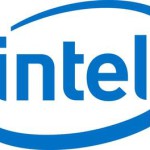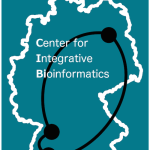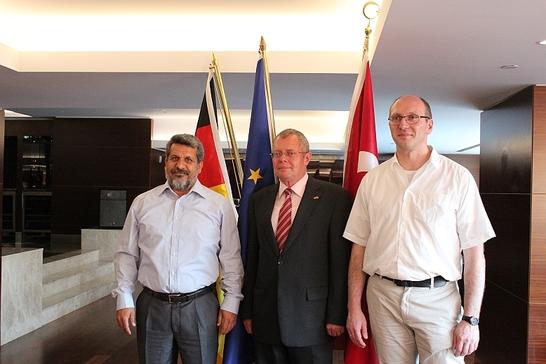With Prof. Annalisa Marsico as co-PI, the Reinert lab was able to secure funding of about 530 thousand Euros for the proposal “Motif-based algorithms for detection of functional classes of long non-coding RNAs” and will work on this for the next three years.
Author Archive: Knut Reinert
SeqAn 2.1.0 Release
We are very pleased to announce the immediate availability of SeqAn-2.1.0! The new version contains a new module for BLAST e-value statistics and I/O, as well as support for Journaled String Trees. C++11 features have been introduced in many places and countless smaller issues have been fixed. The entire codebase has undergone cleanup and especially the build system was improved in many ways. Problems with newer compilers and C++-Standards have been resolved and support for FreeBSD has been added. SeqAn applications are now shipped as static binaries and the library packages correctly install a cmake-module and a pkgconfig file.
Very few API changes were necessary, among them the removal of the random module (which can be replaced with the standard library’s). Support for some compilers had to be dropped, too, most notably we now only support Visual Studio 2015 on Windows so you may be required to upgrade. For more details, see the CHANGELOG. We have also released a new minor level release 2.0.2 which contains only bug-fixes and is fully compatible to previous 2.0.x versions.
Please visit GitHub for more information or head directly to the Downloads.
We would also like to remind you of the upcoming SeqAn User Group Meeting — a great chance to learn about new SeqAn features and discuss with the developers.
Soon we will also present a new homepage, stay tuned!
SeqAn UGM 2016
We are happy to announce the 2016 SeqAn user meeting supported by the CIBI (Center for integrative Bioinformatics), a member of of the de.NBI (German Network for Bioinformatics infrastructure).
The meeting will take place at FU Berlin from March 30th to April 1st 2016. The SeqAn user meeting is addressing bioinformatics students and professionals who want to develop efficient applications for NGS analysis based on an efficient, well-maintained C++ library. In the meeting you will hear talks from groups who actively use SeqAn in their daily work, you will hear about how some of the SeqAn apps work and how they were developed, and finally you get hands-on tutorials to get you started with developing your own SeqAn apps and include them into workflow systems such as KNIME.
Please sign up using this form. The deadline was March 14th 2016 and is now closed.
The meeting will be at the
Freie Universität Berlin,
Institute for Computer Science,
Takustrasse 9, 14195 Berlin,
Room SR 005 (ground floor).
Contact:
Prof. Knut Reinert – knut.reinert (at) fu-berlin.de
Secretary’s Office – anja.kasseckert (at) fu-berlin.de
Below you can see a preliminary schedule.
|
Time\Date |
Wednesday |
Thursday |
Friday April |
|
|
09:00-10:30 |
Welcome and Introduction |
App session 1: Mason App session 2: Imseq |
Tutorial 1: CLP Tutorial 2: Sequences/Iterators |
Tutorial 7: Basic File I/O Tutorial 8: Advanced File I/O |
|
10:30-11:00 |
Break |
Break |
Break |
|
|
11:00-12:30 |
Invited talk 1: Whole-genome sequence analysis of 20,000 Icelanders Invited talk 2: IsomiR-SEA: A new powerful profiling tool reveals novel biological miRNAs and isomiRs features hidden in small RNA-Seq samples. |
App session 3: Lambda App session 4: App session 5: Stellar Talk to Developers |
Tutorial 3: Alignment representation Marcel Ehrhardt Tutorial 4: Alignment algorithms Rene Rahn |
Tutorial 9: Q-Nexus workflow: Extending with KNIME nodes Tutorial 10: Q-Nexus workflow: Developing a new SeqAn node |
|
12:30-14:00 |
Lunch |
Lunch |
Lunch |
|
|
14:00-15:30 |
SeqAn technical talk Introduction to KNIME
|
App session 6: iPec App session 7: KNIME and SeqAn |
Tutorial 5: Indices 1 Tutorial 6: Indices 2 |
Tutorial 11: KNIME integration of SeqAn nodes 1 Tutorial 12: KNIME integration od SeqAn nodes 2 |
|
15:30-16:00 |
Break |
Break |
End of meeting |
|
|
16:00-18:00 |
Introduction tutorial
|
Social Event: Tapas Bar |
|
|
Freie Universität Berlin has been selected as new Intel® Parallel Computing Center (Intel® PCC)
The Intel® PCC program supports universities, institutions, and labs identified as leaders in their fields. It focuses on modernizing applications or software libraries to increase performance on modern microprocessors and coprocessors using parallel computing.
Parallel computing involves the simultaneous operation of multiple processors running elements of a computer program at the same time and is hence much faster than executing the operations sequentially, one after another. This necessitates routines to address the proper use of cores, caches, threads, and vector capabilities of the hardware as well as synchronization routines for parallel computations.
The latest Intel® PCC will be led by Knut Reinert, who is professor for Bioinformatics at the department of Mathematics and Computer Science at Freie Universität (FU) Berlin and a fellow at the Max-Planck-Institute for Molecular Genetics. Mr. Reinert’s research focuses on providing efficient tools for the analysis of Next Generation Sequencing (NGS) data stemming from a technology breakthrough several years ago which enables the cheap sequencing of terabytes of genomic sequence. The Reinert lab based its application development on well-designed algorithmic components and their implementation in the SeqAn C++ software library.
The SeqAn library is well-established and used worldwide in numerous analysis tools for NGS analysis. Since this year, it has also been supported in the CIBI center as part of the German bioinformatics infrastructure network (de.NBI), demonstrating its leading role in the development of new analysis tools for biomedical applications.
“We are very glad that Intel supports our vision for moving biomedical software development forward. SeqAn is a software library containing well designed key components for sequence analysis and we always thought that parallelizing and vectorizing key components of SeqAn will have a big impact on the field by accelerating many applications that make use of those components.”
Knut Reinert, PI
The center will work on abstracting primitives in SeqAn’s template based core to offer a unified interface to multicore and SIMD vector units including the Intel® Xeon and Intel® Xeon Phi™ coprocessors and then accelerate key routines like alignment algorithms or traversing data parallel containers. The generic design of SeqAn makes it well-suited for this approach.
“Intel regards SeqAn as a very promising software package that has all the right ingredients to considerably speed up Next Generation Sequencing analysis on modern Intel processors. We are looking forward to collaborating with Professor Reinert and his team to add our technical know-how about Intel® Architecture and combine it with his algorithmic expertise, and in this way turn SeqAn into a premier software tool in this domain of rapidly growing importance.”
Kristina Kermanshahche
Chief Architect, Intel® Health & Life Sciences
The above strategy will accelerate existing and future applications based on the free SeqAn library (under BSD license) and make hardware acceleration easily available for developers. The FU Berlin will benefit from its role as an Intel® PCC by working with Intel experts and their software tools, and advanced technologies. The Reinert lab will incorporate its work in advanced tutorials and courses at FU Berlin and looks forward to sharing its findings at conferences such as the International Supercomputing Conference and the Intel® Xeon Phi™ Coprocessor User Group (IXPUG) meetings.
FU Berlin Partner im Deutschen Netzwerk Bioinformatik-Infrastruktur (de.NBI)
Das Bundeministerium für Bildung und Forschung (BMBF) fördert ab März für fünf Jahre das Deutsche Netzwerk für Bioinformatik Infrastruktur (de.NBI). Eines der acht Leistungszentren in diesem Netzwerk – das Zentrum für Integrative Bioinformatik (CIBi) – wird dabei für die nächsten fünf Jahre mit zwei Millionen Euro gefördert. CIBi ist ein gemeinsames Zentrum der Universitäten Tübingen und Konstanz sowie der Freien Universität Berlin.
In der biomedizinischen Forschung hat die Einführung von neuen Sequenziermethoden und der hochauflösenden Massenspektrometrie einen Paradigmenwechsel ermöglicht. Die darauf basierenden Hochdurchsatzmethoden wie Genomik, Transkriptomik, Proteomik und Metabolomik – auch Omics-Methoden genannt – geben zwar sehr umfängliche und tiefe Einsichten in zelluläre Systeme, aber die erzeugten Daten sind äußerst umfangreich (im Bereich von Terabytes) und sehr komplex. Zunehmend werden heute auch Daten aus mehreren Technologien parallel erzeugt, zum Beispiel Daten zum Genom und zu den Proteinkonzentrationen in einer Zelle. Für Analyse und Interpretation solcher Datensätze sind daher innovative Algorithmen notwendig. Da ein einzelner Algorithmus für die Analyse dieser Daten nicht mehr ausreicht, werden diese Werkzeuge dann in komplexe Datenanalyse-Workflows eingebunden. Damit wird dann die automatisierte Auswertung selbst komplexester Daten möglich. Das BMBF fördert im Rahmen des Netzwerks die Weiterentwicklung von Algorithmen für die Analyse von Proteom- und Metabolomdaten entwickelt (Tübingen, Softwarepaket OpenMS, Prof. Oliver Kohlbacher), von Genom- und Transkriptomdaten (Berlin, Softwarepaket SeqAn, Prof. Knut Reinert) und der Integration dieser Tools in Workflows (Konstanz, Softwarepaket KNIME, Prof. Michael Berthold)
Das Zentrum für Integrative Bioinformatik ist eng an die anderen sieben Leistungszentren im Deutschen Netzwerk für Bioinformatik angebunden. Das Gesamtnetzwerk wird für fünf Jahre gefördert und nach drei Jahren zwischenevaluiert. Die Koordination des Netzwerks liegt bei der Universität Bielefeld
SeqAn 2.0 released
We are happy to announce the new release of SeqAn 2.0.0.
We have many new features and applications for you and improved many parts in sense of usability, performance and stability.
For example, we have improved the usability and the performance of the I/O-modules. Now BAM-I/O supports parallel read and write operations. We improved automatic read/write operations for compressed file formats, like gzip, bzip2, etc..
We improved the performance of several data structures like the FMIndex, which runs now up to 4 times faster than the old version.
We extended the library with new features like the X-drop extensions for alignments allowing affine gap costs. We added a new realignment module as well as a translation module to translate amino acid alphabet into DNA alphabet.
We implemented many new apps like ANISE and BASIL for insert assembly, Fiona for read error correction, Yara, an enhanced read aligner replacing Masai, and many many more.
With SeqAn 2.0.0 we moved the complete sources to GitHub, which enhances the development cycle in a great way. We improved our build system and added Continous Integration builds with Travis CI. We also updated and improved the API documentation (docs.seqan.de) and switched the tutorials to seqan.readthedocs.org.
You can download the new release and the updated apps from www.seqan.de in the downloads section. You can get the complete sources of the SeqAn 2.0.0 from https://github/seqan/seqan as well.
Simply run:
git clone -b seqan-v2.0.0 https://github.com/seqan/seqan.git seqan-src
and start developing and having fun with SeqAn 2.0.0.
Enjoy!
The SeqAn Team
_______________________________________________
seqan-dev mailing list
seqan-dev@lists.fu-berlin.de
https://lists.fu-berlin.de/listinfo/seqan-dev
FU Bioinformatics – German-Turkish Cooperation
FU Bioinformatics – German-Turkish Cooperation
FU Bioinformatics co-organized the first International Workshop on MS-Based Proteomics, Bioinformatics and Health Informatics with Turkish partners in Izmir
News from Jul 09, 2014
Together with the Izmir Institute of Technology and Hacettepe University, the FU Berlin organized the first International Workshop on MS-Based Proteomics, Bioinformatics and Health Informatics.

With funding from German-Turkish collaboration funds and local partners the workshop successfully initiated a lively exchange between German and Turkish groups working in MS-based Proteome research. The three day program included speakers from both countries, augmented by international partners from the USA, Canada, and Switzerland.
(from left: Prof. Talat Yalcin, IZTECH – Thomas Gerlach, Consul General of Germany – Prof. Knut Reinert, FUB)
The German Consul General Thomas Gerlach recognized the workshop as an important contribution to the German-Turkish Year of Research, Education and Innovation.
Reinert lab named CUDA research center
The Reinert lab at the FU Berlin has been selected as a CUDA rearch center. For more information read here.






